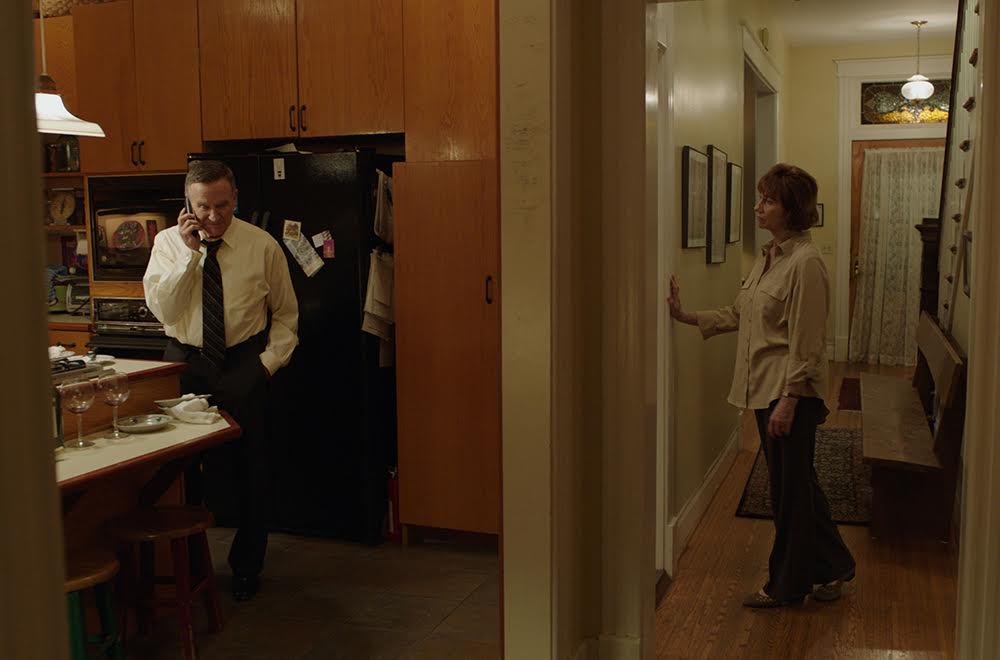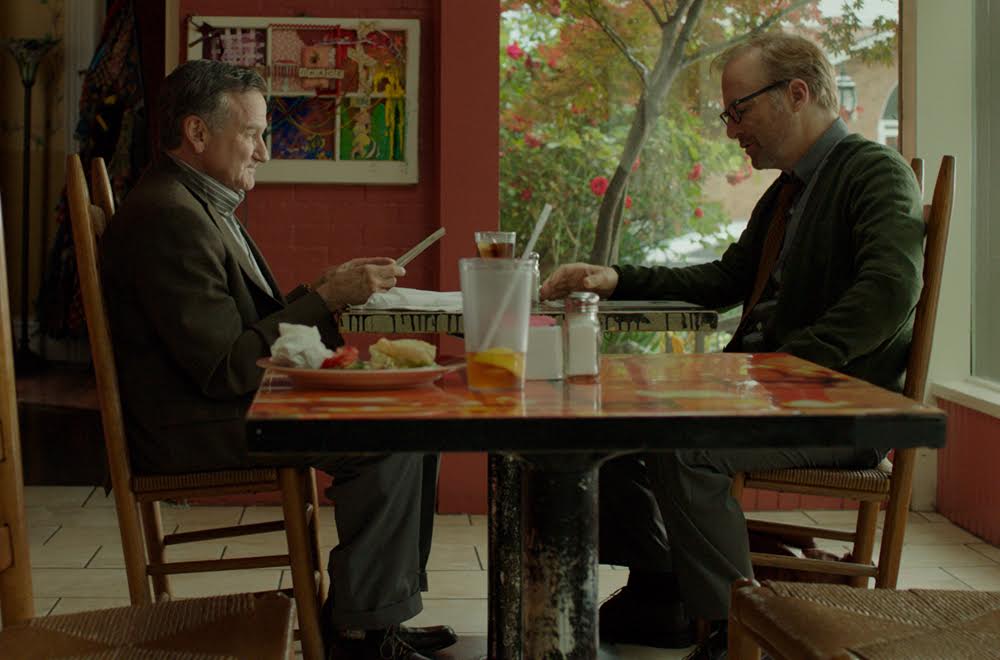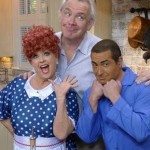In the movie “Boulevard,” Robin Williams plays Nolan Mack, a 60-year-old bank worker who spontaneously takes a dramatic U-turn — literally and figuratively — when he drives down an unfamiliar street and becomes intrigued by a young male hustler, Leo (Roberto Aguire), who asks if Nolan can give him a lift.
After forming a peculiar connection with Leo, Nolan faces the fact that he is gay and has spent his life hiding that. He’s hidden it from his wife Joy (Kathy Baker) and even from himself. Nolan’s climactic decision to confront who he really is proves the old adage: It’s never too late to change.
From director Dito Montiel and written by Douglas Soesbe, “Boulevard” also stars Bob Odenkirk (TV’s “Better Call Saul,” “Breaking Bad”) as Winston, Nolan’s supportive best friend. Montiel was drawn to “Boulevard” because of its poignant and universal themes. “When I read Douglas Soesbe’s script, I thought about how many people are in Nolan’s situation in some way or another,” Montiel told TheBlot Magazine. “It really is every man’s story. Nolan does not have a terrible life; his wife is not mean to him, he has a decent job and the prospect of a promotion, he lives in a nice house. But emotionally he feels empty, as if he is sleepwalking through a lonely and subdued world, devoid of all passion.”
This is the last film from the beloved Williams, who tragically hanged himself in August 2014, two weeks shy of 63. Williams struggled for years with depression and substance abuse, but what led to his suicide was the neurodegenerative disease Lewy Body Dementia (LBD) combined with Parkinson’s disease.
In November, ABC News reported:
“All people with LBD have dementia, and sometimes appear confused and disoriented and exhibit unusual behavior, said Angela Taylor, the director of programming for the Lewy Body Dementia Association. According to the coroner’s report, Williams had been acting strangely before his death. He is said to have kept several watches in a sock and was very concerned about keeping the watches safe.”
The much-missed Williams began his career as a standup comedian in the mid-1970s, then made it big as the hilarious alien Mork on the hit show, “Mork & Mindy.” Williams worked for four decades making films; my favorites include “One Hour Photo,” “The Fisher King,” “Good Morning, Vietnam” and “Good Will Hunting.” In 1998, Williams won an Academy Award for Best Supporting Actor for “Good Will Hunting,” and during his long and magnificent career, he received two Primetime Emmy Awards, six Golden Globe Awards, two Screen Actors Guild Awards and four Grammy Awards.
Williams gives a gripping performance in “Boulevard,” and director Dito Montiel spoke openly about working with the late actor on his last film during this interview with TheBlot Magazine.
Dorri Olds: What was Robin Williams’ take on his character?
Dito Montiel: We were on the same page, which was really nice. There was one scene in particular where Robin as Nolan and Kathy as Joy are in bed together, and they both say “I love you.” It wasn’t in the script, but I said, “You love her. Why don’t you tell her you love her?” Robin said, “Yeah, I would,” and then Kathy said, “I love you, too.” I thought that scene was so touching because they’re saying so many things. They’re saying, “I love you” and “It’s over” and “Goodbye.”
Robin, Kathy and I felt strongly that this was a loving marriage, just not the right loving marriage for Nolan. Kathy had an interesting thing to say, and then Robin said it all the time. It was that their characters had an unwritten agreement, and Nolan was breaking it. That’s why Joy was so mad. They have the big blowout when they finally have this conversation. It was like a “don’t ask, don’t tell” marriage for too long.
Could you tell that Robin was feeling depressed?
That’s impossible to know. We talked all the time, but it was about his character mainly, and he was as obsessed as I was about it. We would just literally talk at crazy lengths about Nolan and walk around all night while shooting. It was impossible to tell that sort of thing. You never know with anybody, unfortunately. It’s one of those weird things. He’d joke around when I’d try to give him direction about how sad Nolan was, and he’d say, “I’ve done the research.” There’s a side to Robin that is outrageous, that goes on David Letterman. Then there’s the guy who goes home at night trying to sit by himself and think about things.
How long was it between when you finished the film and Robin’s death?
The movie was done, and he had seen it. “Boulevard” premiered in April 2014 at the Tribeca Film Festival, and Robin died in August. Before we were done with the cut, I made sure he saw it, and he’d given me his thoughts. I’m glad he saw the final cut. Robin and I were both really happy with it. I always save my messages when it’s people like Robin Williams. His message had a big “Wow!” in it.
Read more: Remembering Robin Williams
What can you tell me about Bob Odenkirk?
I’m a fan — like everyone else. I love him so much. Obviously, on “Better Call Saul” he’s showing what a really wide range he has as an actor, so I thought, “Oh, wow, he’d be great.” He is known more for comedy, like Robin was. I thought it’d be fun to have the two of them together as friends in less-outrageous roles, and it wasn’t just Nolan and Winston. Robin and Bob had an immediate kinship. They come from similar worlds and both had been around for a while doing comedy, so I think they mutually had a lot of respect for each other. That right away helped them connect. It was nice that they jumped right into it because they had never met before.
You’ve had access to so many stars for your films including Robert Downey Jr., Chazz Palminteri, Dianne Wiest, Shia LaBeouf. What’s your secret?
I’m lucky, I guess. It’s weird. I wish I knew how it worked. I never went to school for any of this stuff. The most I knew of Robin Williams before this, except for being a fan, was I ran into him in New York once when I was a messenger delivering a package, and he was in an elevator. Then you get a chance to just start talking about a character, and next thing you know you’re working with him, which is really a nice thing.
What’s next for you?
I just finished a movie with Shia and Gary Oldman and Kate Mara called “Man Down,” but we’re just finishing it now, so I’m not sure when that’ll be out.
That’s two guys who have a rep for being difficult to work with. Were they?
Oh, man, I like difficult! [Laughs] I was on tour with a hardcore band in a van for years. That’s difficult. Those guys are great actors. To me, I’ll take that any day.
With Shia, when you say “Cut,” does he immediately go back to his personality, or does he stay in character?
He hangs around in it for a while. That’s dedication.
He’s still a method actor, right?
He certainly is. I don’t understand any of that stuff. I just know Shia’s really good. So if you want me to call you a different name, I’m happy to. I’m a fan of great acting, and everyone’s got their own deal, so whatever it takes is fine by me.
After working on movies together, it must be bittersweet saying goodbye.
Yeah, it’s weird. You’re so close, and it’s so intense. You’re talking about really intense things that the characters are going through and trying to get everyone to touch into the deepest part of their soul, and then you say, “Cut,” and everybody goes home. It’s a weird one.
“Boulevard” opens in theaters Friday, July 10. LGBT drama. Rated R. 88 min.
Watch the trailer:
Dorri Olds is a contributing journalist for TheBlot Magazine.









